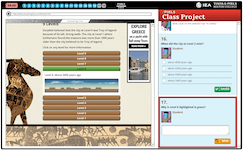
INTERNATIONAL RESULTS IN READING
PIRLS 2021 is the fifth cycle of the Progress in International Reading Literacy Study. Since 2001, PIRLS has provided high-quality data for monitoring progress in students’ reading achievement at the fourth grade, covering 20 years of trends. The PIRLS reading assessment is based on a comprehensive framework that focuses on two overarching purposes for reading — for literary experience and to acquire and use information. PIRLS 2021 results provide descriptions of students’ reading skills and strategies at four international benchmarks on the PIRLS reading achievement scale for meaningful interpretation of reading achievement scores.

Results Highlights from PIRLS 2021
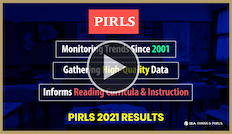
Watch the video of highlights from the PIRLS 2021 international results.
PIRLS 2021 Data Visualizations
The PIRLS 2021 data visualizations present selected PIRLS 2021 data in interactive formats. The visualizations allow users to customize the presentation by selecting particular countries of interest and sorting the data in different ways.
View the Exhibit 1.3 Data Visual View the Exhibit 2.1 – 2.2 Data Visual View the Exhibit 2.3 – 2.4 Data Visual View the Exhibit 4.2 Data VisualPIRLS 2021 Insights Series
The PIRLS Insights series provides a closer look at specific educational research topics using PIRLS data. Publications in this series will be released on a rolling basis.
+ VISIT THE PUBLICATIONSVideo Examples of the PIRLS 2021 Texts and Items
Video examples of one Literary text, The Empty Pot, and two Informational texts, Oceans (ePIRLS task) and The Amazing Octopus, can be viewed below. The videos show each text in its entirety, together with its items.
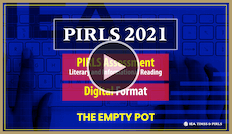
The Empty Pot
Digital PIRLS Literary
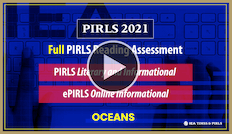
Oceans
ePIRLS Online Informational
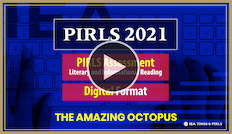
The Amazing Octopus
Digital PIRLS Informational
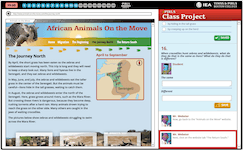
Take the ePIRLS Assessment
In ePIRLS online informational reading tasks, students navigate through simulated webpages containing text, graphics, links, pop-up windows, and animations to complete school-like assignments. Try out this assessment of online informational reading yourself with two ePIRLS tasks, Zebra and Wildebeest Migration and The Legend of Troy.
Frameworks
The PIRLS 2021 Reading Assessment Framework and PIRLS 2021 Context Questionnaire Framework provide the foundation for the PIRLS 2021 assessment.
Encyclopedia
The PIRLS 2021 Encyclopedia: Education Policy and Curriculum in Reading contains exhibits that summarize aspects of countries’ education systems and a chapter provided by each country describing its reading curriculum and instruction.
+ View the PublicationMethods and Procedures
The Methods and Procedures: PIRLS 2021 Technical Report documents the development of the PIRLS assessments and questionnaires and describes the methods used in sampling, translation verification, data collection, database construction, and the construction of the achievement and context questionnaire scales.
+ View the PublicationInternational Database
The PIRLS 2021 International Database includes student achievement data as well as student, home, teacher, school, and national context data for the 57 countries and eight benchmarking entities in PIRLS 2021. The international database is available for researchers to conduct their own secondary analyses with PIRLS 2021 data.
+ VISIT THE DATABASEContext Questionnaires
The PIRLS 2021 Student, Home, Teacher, and School Questionnaires collect important information from students and their parents, teachers, and school principals about the contexts for teaching and learning reading. The Curriculum Questionnaire collects information from the PIRLS National Research Coordinators about the structure of the education system and organization and implementation of the reading curriculum in each country.
+ VIEW THE QUESTIONNAIRES
